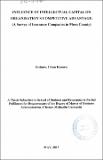| dc.description.abstract | This study sought to analyze the influence of intellectual capital on competitive advantage. The specific objectives were to determine the influence of innovation capital, human capital, structural capital and relational capital on competitive advantage. Despite organization having intellectual capital in Kenya it faces a challenge of organization putting more infancy on the intellectual capital of the management and unwillingness to change even though it can give the organization a better competitive edge in the already flooded market. Organizations clearly require a creative, motivated workforce which is intellectually professional and which contributes to the strategy of increasing value in aggressively changing environmental conditions. It is imperative therefore, for firms to develop best practices for utilizing and managing intellect in order to build arid sustain a competitive advantage over a long-term. Most organizations in the developed countries are performing well because there is proper utilization and management of intellectual capital. The study employed descriptive research design and the target population consisted of 115 departmental heads in the insurance companies in Meru. The sample size was determined by calculating 50% of the number of departmental heads in each Insurance Company resulting to a sample size of 55 respondents. Primary data was collected using open ended and close ended questions. Descriptive statistics and multiple linear regression was also used to analyze the data. Analyzed data was presented in the form of frequency tables and percentages. The research findings indicate that there is a significant positive relationship between innovation capital, human capital and relation capital with competitive advantage of insurance companies but there was no significant relationship between structural capital and competitive advantage of insurance companies. The researcher recommends that: Understanding of customer is a key ingredient of intellectual capital to creating a solid relationship between an enterprise and its customers. Employees of insurance companies to possess technical, interpersonal, and conceptual skills to effectively plan, lead, organize and control the enterprise effectively leading to increased performance and consequently competitive advantage. | en_US |

